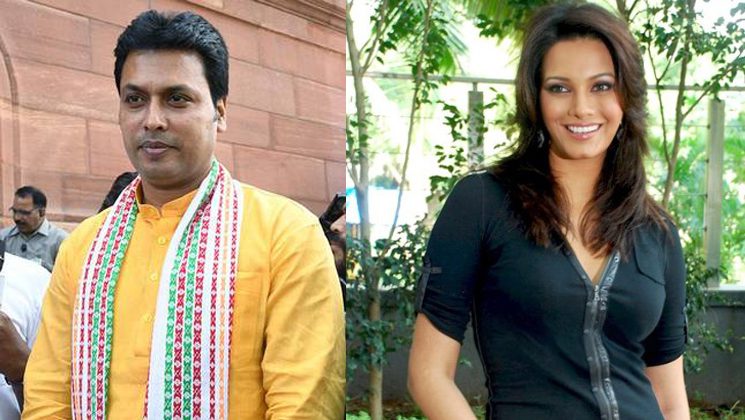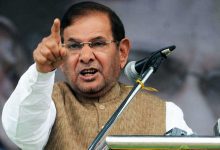Biplab Deb is a product of this xenophobic tradition, which gives pride of place to religion over the constitutional rights of every citizen, irrespective of his or her faith. It is nearly impossible for him, therefore, to accept that an “alien” should not only represent India but even win a world title on the country’s behalf. Here’s a report, for Different Truths.
The belief that Tripura chief minister Biplab Kumar Deb mocked Miss World 1997, Diana Hayden, because of her brown skin, “Even Diana Hayden got it (the crown). See, everyone is laughing!” – isn’t quite right.
Perhaps this idea gained ground because of the lavish praise which the chief minister bestowed on another beauty queen, Aishwarya Rai, as the ideal Bharatiya Nari, to use a term favoured by the BJP. Since Aishwarya is fair-complexioned to Indian eyes, it was believed that Diana’s brown skin was the reason why the chief minister found her unworthy of winning the Miss World title.
But the real reason for Deb’s disparagement of Diana – for which he has now apologised – is something else. It is the fact that she is a Christian and an Anglo-Indian. To the “nationalists” in the BJP, anyone who is not a Hindu cannot be regarded as a true son or daughter of Bharat Mata.
For the BJP, the name itself – Diana Hayden – is un-Indian. The party would have preferred it to be something like Kavita Sharma. It is an important part of the Hindutva catechism enunciated by V D Savarkar that Muslims and Christians are “aliens”. M G Golwalkar went a step further to brand Muslims as Internal Enemies No. 1 and the Christians as Internal Enemies No. 2.
Deb is a product of this xenophobic tradition, which gives pride of place to religion over the constitutional rights of every citizen, irrespective of his or her faith. It is nearly impossible for him, therefore, to accept that an “alien” should not only represent India but even win a world title on the country’s behalf.
His mentioning of Lakshmi and Saraswati, while trashing Diana gave the game away although his description of the goddesses as ideal Indian beauties was absurd because Lakshmi and Saraswati are worshipped and not seen as beautiful ladies. Someone like Deb probably cannot even conceive that Diana may actually revere Lakshmi and Saraswati as an Indian even if, as a Christian, she cannot worship them in a formal sense.
For the BJP’s followers, however, being a Christian (or a Muslim) can ipso facto invite disapproval. It is worth recalling how Narendra Modi, as Gujarat’s chief minister, spelled out the name of the then chief election commissioner, James Michael Lyngdoh, in full to suggest to his audience that as a Christian, he may not play fair during the 2002 assembly elections.
If Christians cannot be trusted, neither can any faith be placed in what Deb called the international fashion mafia. To him and his party men, this aspect of the world scene is linked to the conspiracies in which the foreign-funded NGOs are allegedly engaged in to subvert Indian culture and even politics. Not surprisingly, he saw in the success of Indian girls in beauty contests in recent years a “plan” by the international companies to “take over the traditional Indian products”.
Before the Diana episode, Deb’s claim to fame was to say that Sanjaya in the Hindu epic, Mahabharata, was telecasting the Kurukshetra war for Dhritarashtra’s benefit with the help of satellites and the Internet. The chief minister’s assertions on these subjects underline two key aspects of saffron politics.
One is a glorification of India’s Hindu past (when there were no internal enemies) even if the eulogies are based on bizarre claims, and the other is an attitude which instinctively places the minorities in a category lower than that of the Hindus – an outlook which reflects Golwalkar’s thesis that the minorities “may stay in the country wholly subordinated to the Hindu nation, claiming nothing, deserving no privileges, far less any preferential treatment, not even citizen’s rights”.
It is obvious that this mindset is antithetical to the Constitution since it rejects the need to promote a scientific temper, as enunciated in the Constitution, and negates the concept of equal rights of citizens. What is more, these beliefs about what Pervez Hoodbhoy, a Pakistani nuclear physicist, derided as the “crackpot” science being pursued in India at present are so deeply embedded in the saffron psyche that there is no possibility of a change or modification of the outlook as long as the BJP remains in power.
The danger, as is obvious, is that these weird and anti-constitutional ideas will be propagated by saffron chief ministers and Union ministers – Darwin was wrong, the Vedas mentioned the theory of relativity – in a seemingly orchestrated manner to undo the country’s scientific, liberal and secular tradition.
The Hindutva camp is apparently intent on undermining this heritage because of its association with Jawaharlal Nehru, who has become the Sangh Parivar’s latest object of hate with a saffron blogger claiming that India’s first prime minister died of syphilis.
Tripura’s chief minister and governor, Tathagata Roy, who recalled Jan Sangh founder, Syama Prasad Mookerjee’s prescription of a civil war to solve the Hindu-Muslim “problem”, can be said to be the torch-bearers of the “new India” favoured by Modi. To many, the prospect will not be pleasing.
Amulya Ganguli
©IPA Service
Photo from the Internet





 By
By
 By
By
 By
By
 By
By